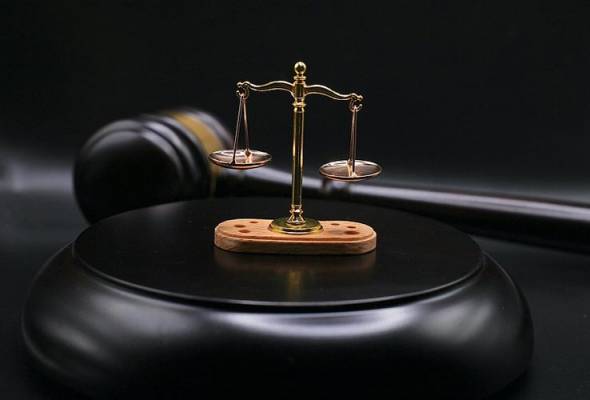
Published in AstroAwani & TheMalaysianInsight, image by AstroAwani.
The investigation by the Malaysian Anti-Corruption Commission (MACC) into Yang Arif Justice Dato’ Mohd Nazlan Ghazali’s alleged or so-called “conflict of interest” in presiding over the first instance trial involving ex-Prime Minister Najib Razak as the defendant is an eminent case of overreach and abuse of jurisdiction in and of itself – whereby the charges related to SRC International are as follows in pursuant to:
- Section 23 of the Malaysian Anti-Corruption Commission (MAAC) Act, 2009 (abuse of power),
- Section 409 of the Penal Code (CBT) and, finally,
- Section 4(1)(b) of the Anti-Money Laundering, Anti-Terrorism Financing and Proceeds of Unlawful Activities Act 2001 (money laundering).
The claim by MACC that it has the jurisdiction to do since there’s an allegation of abuse of power per simpliciter (merely) is simply specious and untenable.
A case where an allegation of conflict of interest is confined, ab initio (from the beginning) and in loco (on the spot), to ethical matters is clearly and definitively outside the jurisdiction/ambit and scope of the MACC (as defined by the governing MACC Act, 2009) which is tasked and empowered solely and exclusively to concern itself with criminal matters and, by extension, abuse of power of a criminal nature.
The (absolute and clear-cut) distinction between that which is merely ethical and that which is criminal has been wholly lost on the MACC.
In other words, the MACC can only act if there’s a suspicion of prosecutable offence, i.e., one involving or concerning bribery or gratification of some sort.
Even though all criminal matters involve breach of ethics, not all breach of ethics involve criminal elements.
To put the logic in a different way: Even though all Sunnis are Muslims, not all Muslims are Sunni (i.e., in reference to the Shias).
Or to provide a concrete example by reference to the underlying facts giving rise to the allegation of breach of ethics in the form of bias: Justice Nazlan whose only so-called “cause of concern” is indirectly related to the case of SRC International by virtue of being Maybank’s general counsel and company secretary from 2006 to 2015 isn’t a criminal matter at all.
Maybank – as a third party – was involved in providing a loan to SRC International indirectly but which isn’t in anyway related to the charges thereof (no apparent bias).
Besides that, as is the case, Justice Nazlan no longer has any links whatsoever with Maybank (no actual/real bias).
This is as confirmed in the judicial review findings of the Federal Court which was presided over by Yang Arif Datuk Vernon Ong (March 30, 2023).
Interference by the MACC, “willy-nilly”, into any allegation of breach of ethics is clearly contrary to the rule of law, due process and separation of powers, as aptly put in an editorial by The Malaysian Insight entitled, “Ethics of judges, ministers, investigators” (April 6, 2023).
The editorial poses the rhetorical question, “Who decides Malaysian judges have broken their code of ethics? Is it a criminal offence? For sure, [its] only the [Judges’] Ethics Committee that decides …, no one else”.
As pointed out so saliently by constitutional lawyer New Sin Yew, allegations against Justice Nazlan doesn’t involve any prescribed offence under the MACC.
Section 3 outlines what a “prescribed offence” is:
- any offence under any written law as specified in the Schedule [i.e., under the Penal Code – which is solely and exclusively criminal in nature);
- an offence punishable under section 137 of the Customs Act 1967;
- an offence under Part III of the Election Offences Act 1954;
- an attempt to commit any of the offences referred to in paragraphs (a) to (c); or
- an abetment of or a criminal conspiracy to commit (as those terms are defined in the Penal Code).
Under Section 7(a) of the MACC Act (2009), the MACC can only investigate upon receiving and considering any report of an offence therein. The MACC can only:
“(b) … detect and investigate –
- any suspected offence under this Act;
- any suspected attempt to commit any offence under this Act; and
- any suspected conspiracy to commit any offence under this Act …”.
It’s surprising and awkward, therefore, for our Minister in the Prime Minister’s Department (Law and Institutional Reform) YB Azalina Othman (MP for Penggerang) to sidestep the issue of the MACC’s overreach in her press statement.
Be that as it may, the press statement by Datuk Ahmad Rosli Mohd Sham who’s the Chairman of the MACC’s Operation Review Panel that “… no one or parties should be exempted from investigations by law enforcement, be it members of the administration, the legislative or the judiciary” is inapplicable in this instance, and, therefore erroneous.
Datuk Ahmad Rosli appealed to an old circular letter – “Surat Pekeliling Perkhidmatan Bil. 17 (1975).
The process stipulated therein involved the National Bureau of Investigation (NBI) which is no longer in existence and its governing legislation (enacted in 1973) has been repealed by the Anti-Corruption Act (1997). In turn, the 1997 legislation has since been repealed/superseded by the MACC Act (2009).
This means that the process dealing with abuse of power and the correlation of corrupt practices involving civil servants as mentioned in the Surat Pekeliling Perkhidmatan Bil. 17 (1975) is no longer valid (i.e., outdated) which is now subjected and accountable to a higher degree of standard.
The same applies to the Surat Pekeliling Perkhidmatan Bil. 5. (1997) which was also cited by Datuk Ahmad Rosli.
Some background in order.
The NBI and the Anti-Corruption Agency (ACA) at the time were less autonomous compared to the MACC and as its officers were seconded from government departments and agencies, there was some reluctance to thoroughly investigate allegations of corruption involving fellow civil servants for fear of future repercussions.
And hence the circular letters as alluded to, where the disciplinary procedures were “shifted (back)” to the heads of departments and agencies, i.e., internalised (see p.605, “Combating Corruption: The Malaysian Experience”, Y. Mansoor Marican, Asian Survey, Vol. 19, No. 6, June, 1979, pp. 597-610).
In other words, the circular letters reflected administrative and procedural convenience rather than the legal responsibility (of the then NBI and the Anti-Corruption Agency/ACA).
Hence, the blurring of the lines between ethical and criminal matters in the two circular letters.
As it is, by right, this shouldn’t be the case at all.
In other words, both the NBI and ACA in concert with the then Director Generals of Public Service have all erred in their interpretation and understanding of the due process.
Here, to be fair, it’s not a question of jurisdiction but of due process, i.e., the disciplinary procedure.
We see this under Section 15(1) of the Anti-Corruption Act (1997) which unqualifiedly and unequivocally states that:
“Any officer of a public body who uses his office or position for any gratification shall be guilty of an offence”.
Section 23(1) of the MACC Act (2009) – which is substantially the same and goes further – states that:
“Any officer of a public body who uses his office or position for any gratification, whether for himself, his relative or associate, commits an offence”.
This is then subsequently followed by Section 24(1) of the MACC Act (2009) – after the completion of the provision under Section 23 overall:
“Any person who commits an offence under sections 16, 17, 20, 21, 22 and 23 shall on conviction be liable to –
- imprisonment for a term not exceeding twenty years; and
- a fine of not less than five times the sum or value of the gratification which is the subject matter of the offence …”.
Furthermore, and more to the point, there’s a categorical error also as the MACC has no jurisdiction over (superior court) judges as they’re not “civil servants” by constitutional definition.
This means that the two circular letters concerned, apart from being outdated, is also irrelevant as far as (superior court) judges are concerned.
This is to ensure separation of powers as civil servants strictly comes under the Executive.
In our Federal Constitution, the Judiciary under Part 9 (Articles 121 to 131A) comes before (and, hence, is treated distinctly and separately from) the Public Services under Part 10 (Articles 132 to 148).
Clearly, (superior court) judges are not subject to the authority of the Director General of Public Service as they’re appointed by the Judicial Appointments Commission (JAC).
It’s set up under the JAC Act (2009) to assist the Prime Minister in advising the Yang di–Pertuan Agong (YDPA) on the appointment of judges of the superior courts and judicial commissioners, including the chief judges and judges of the two High Courts of Malaya alongside that of Sabah and Sarawak.
This includes Justice Nazlan who’s currently a Court of Appeal (i.e., superior court) judge.
It’s different when it comes to the subordinate courts – the magistrates’ and sessions courts. These come under the Judicial and Legal Service Commission as governed by Articles 138 and 144(1) of the Federal Constitution.
So, subordinate judges (as judicial officers) would be civil servants and yet in their own distinct category (also).
The Chairman of the Judicial and Legal Service Commission is none other than the Director General of Public Service who’s currently Tan Sri Zainal Rahim Seman.
Thus, to quote from the “Joint Statement by Lawyers against Intimidation of Judiciary” (Malaysia Now, April 8, 2023), the investigation by the MACC “… constitutes a serious transgression … of its authority and jurisdiction under [the] governing act. The [MACC’s investigation] concerns issues that are not within [its] purview or competence. [It’s] clear that the MACC [can’t] make findings or come to a view, nor decide on matters that fall outside its jurisdiction but which are squarely within the purview of the judiciary” in relation to the Judges’ Ethics Committee as governed by the Judges’ Ethics Code (2009) and the Judges’ Ethics Committee Act (2010).
Section 2 of the 2010 Act stipulates that a “judge” refers to a judge of the High Court, Court of Appeal and the Federal Court.
This means (again – as confirming) that a clear-cut distinction is made between a judge as constitutionally defined and a judicial officer deemed civil servant.
As such, even at best tenuous, MACC’s jurisdiction to investigate breaches of ethical conduct extends to judicial officers only (just for the sake of argument).
Finally, to quote from the Joint-Statement again, “[i]n any event, such circulars cannot override the MACC Act. MACC only has the power to investigate alleged corruption and matters related thereto”.
To conclude, we join in the calls for the Attorney General to issue a statement to uphold the rule of law and separation of powers and re-affirm constitutional supremacy over-against any attempts to cast aspersion on the integrity of the judgments of the then High Court judge, Justice Nazlan and, by extension, the three-bench Court of Appeal judges together with the five-bench Federal Court judges.
The finality of the judicial process as embodied by the judgment of the Federal Court – as the apex court – must be upheld and respected (see, “Najib’s SRC International case: All parties should respect decision of courts”, statement by the President of the Malaysian Bar Council Karen Cheah, Aliran, April 4, 2023).
Jason Loh Seong Wei is Head of Social, Law & Human Rights at EMIR Research, an independent think tank focussed on strategic policy recommendations based on rigorous research.

